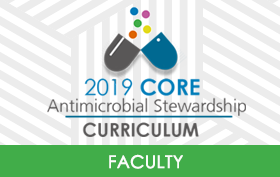
Antimicrobial Stewardship in Everyday Practice (Faculty)
Section 2: Antimicrobial Stewardship in Everyday Practice
Content in this section is available through 5 case-based scenarios. These include:
- AS in Everyday Practice: A Clinic Visit Case
- AS in Everyday Practice: The Antibiotic Approval Request Case
- AS in Everyday Practice: The Curbside Call Case
- AS in Everyday Practice: The Prospective Audit and Feedback Cas
- AS in Everyday Practice: The Rapid Diagnostic Dilemma Case
As the faculty or stewardship champion leading this effort, you can decide how the content is distributed and presented to your stewards- in- training.
For Stewards:
The fellow/trainee can watch the eLearning on their own, followed by a debrief between fellow and faculty.
For Faculty:
To present in a classroom or small group setting, there are three methods of delivery:
Method 1: | You can open the eLearning and let it talk for you, controlling the slides and the pace |
Method 2: | You can open the eLearning, disable the audio, and talk through the eLearning slides yourself |
Method 3: | You can use the case - based scenario guides for both faculty and |
- The cases are based on common ID clinical scenarios and highlight specific AS practices in routine clinical care.
- Each of the 5 cases has formative questions embedded in the case, suggestions for applying concepts to the steward-in-training’s institution, and a “clinical pearls” pocket card for reference.
- Stewards- in- training are encouraged to complete at least 3 AS debriefing activities with their supervising faculty during routine patient care using the AS Clinical Teaching Tool.
The AS Clinical Teaching Tool reinforces principles of AS in everyday practice and can be used to provide formative feedback to stewards in training any time after an “Introduction to AS” is completed.
Target Audience
Program Directors, Antimicrobial Stewardship Faculty Champions, and additional Faculty responsible for leading and implementing the CAS Curriculum.
Learning Objectives
Upon completion of this section, stewards- in- training will be able to:
- Judge when to recommend formal ID consultation or AS intervention
- Recognize the major “infectious diseases syndromes” where antimicrobials are over- and misused in acute care inpatient and outpatient settings, and thestewardship techniques to improve prescribing for these infections
- Identify common process and outcome measures/metrics
- Compare and contrast effective AS techniques in the inpatient vs. outpatient settings
AS Curriculum Workgroup COI Summary Reviewed April 2017 by Rachel Simmons, MD No conflicts found
| Name | Individual's Role in Activity | Name of Commercial Interest | Nature of Relationship |
|---|---|---|---|
| Abbo, Lillian | Workgroup member | Pfizer Brazil | Honoraria |
| Advani, Sonali | Workgroup member | Nabriva Therapeutics | Advisory/Consultant Role |
| Amstrong, Wendy | Workgroup member | None | |
| Barsoumian, Alice | Workgroup member | None | |
| Beeler, Cole | Workgroup member | None | |
| Bystritsky, Rachel | Workgroup member | None | |
| Cherabuddi, Kartik | Workgroup member | Gatorade | Start - up Research Fund |
| NIH (Medimmune) | Research Grant | ||
| Cohen, Seth | Workgroup member | None | |
| Hamilton, Keith | Workgroup member | None | |
| Ince, Dilek | Workgroup member | Ansun Pharma | Research Grant |
| Justo, Julie Ann | Workgroup member | None | |
| Logan, Ashleigh | Staff | None | |
| Luther, Vera | Workgroup member | None | |
| Lynch, John | Workgroup member | Astellas Pharmaceuticals, Juno Therapeutics | Advisory/Consultant Role |
| Nori, Priya | Workgroup member | None | |
| Ohl, Christopher | Workgroup member | Paratek, Bayer, Cempra Pharmaceuticals | Advisory/Consultant Role |
| Patel, Payal | Workgroup member | None | |
| Pottinger, Paul | Workgroup member | McGraw Hill, Elsevier | Honoraria |
| Schwartz, Brian | Workgroup member | None | |
| Spicer, Jennifer | Workgroup member | None | |
| Stack, Conor | Workgroup member | None | |
| Zhou, Yuan | Workgroup member | None | |
| Shnekendorf, Rachel | Staff | None |

 Facebook
Facebook X
X LinkedIn
LinkedIn Forward
Forward